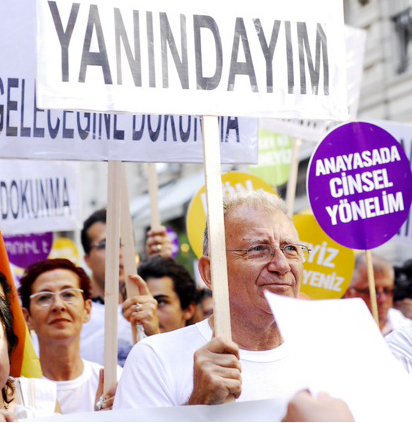 Independent filmmaker, Can Candan has been making films since 1989, previously focusing the content on cultural identity and human rights. His third film, ‘My Only Child’ brings mothers and fathers of LGBTs in Istanbul, Turkey to the forefront, a country renowned for its homophobia. After encountering members of Listag (Families of LGBTs) for the first time at Bogazici University, where he is also a lecturer, he was compelled to tell their story; ‘There at the conference, were four parents talking very openly and movingly about their experiences. As I sat there listening in tears, both as a parent of a 6 year-old boy and as a 42 year-old adultchild, I realized that, although they were talking about their unique personal experiences, they were also addressing something that each human being can relate to: a person’s struggle to be who he/she really is and being accepted as such. And, in my ongoing process of being a father, I am trying to learn how to care for my own child, how to support and guide him, and at the same time nurture his quest to find himself as freely as possible.’ With the inherent belief that documentaries hold transformative power on ideals, Can is convinced that true human change derives first from the individual; ‘documentaries have a unique capacity to bring such experiences to a larger public and affect personal, social, and political transformation. When you are able to touch people’s hearts, when you can make them feel something deep in their hearts regardless of their beliefs, values or orientation, that’s when real change happens and it happens fast. With this film, I will try to touch that deep place in each viewer.’
Independent filmmaker, Can Candan has been making films since 1989, previously focusing the content on cultural identity and human rights. His third film, ‘My Only Child’ brings mothers and fathers of LGBTs in Istanbul, Turkey to the forefront, a country renowned for its homophobia. After encountering members of Listag (Families of LGBTs) for the first time at Bogazici University, where he is also a lecturer, he was compelled to tell their story; ‘There at the conference, were four parents talking very openly and movingly about their experiences. As I sat there listening in tears, both as a parent of a 6 year-old boy and as a 42 year-old adultchild, I realized that, although they were talking about their unique personal experiences, they were also addressing something that each human being can relate to: a person’s struggle to be who he/she really is and being accepted as such. And, in my ongoing process of being a father, I am trying to learn how to care for my own child, how to support and guide him, and at the same time nurture his quest to find himself as freely as possible.’ With the inherent belief that documentaries hold transformative power on ideals, Can is convinced that true human change derives first from the individual; ‘documentaries have a unique capacity to bring such experiences to a larger public and affect personal, social, and political transformation. When you are able to touch people’s hearts, when you can make them feel something deep in their hearts regardless of their beliefs, values or orientation, that’s when real change happens and it happens fast. With this film, I will try to touch that deep place in each viewer.’
This documentary touches upon a sensitive topic in your country, was there a fear of alienating your friends or colleagues because you were taking part?
I did not particularly feel any fear of alienating my friends and colleagues because I have been a vocal supporter of LGBT causes for some time. Of course, being out there publicly with this project is a new experience for me. So far, reactions have been nothing, but supportive. There have even been a few favorable articles published in the mainstream press. I am sure that once the project becomes more publicly known, we will receive our share of negative reactions and hate speech. At the same time, this film is about the experiences of parents, so it is a family film. If people feel uncomfortable about us making a film about the experiences of families with LGBT children, then it is their problem. I hope they will see this as a chance to think about their own homophobia, transphobia, and ignorance and fear regarding human sexuality – that is exactly what we are trying to achieve with this film.
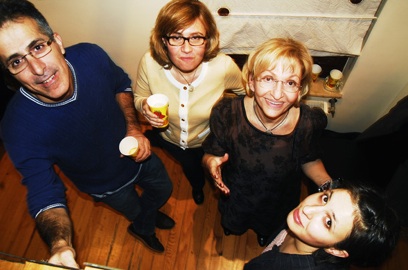 Tell us about how involvement in the film has contributed to the relationships between the other mothers and fathers in the film.
Tell us about how involvement in the film has contributed to the relationships between the other mothers and fathers in the film.
The mothers and fathers featured in the film are the core of a solidarity and support group called Listag (Familes of LGBTs in Istanbul). They have been in existence since 2008 and these parents have been meeting frequently to offer each other support, reach out to other families, discuss issues around sexuality, and organize their political activities. So, they know each other well and have been collaborating for some years. Being part of this film, I feel has helped strengthen the already established bond between them and had fueled their enthusiasm to reach out to more and more families. Being in this film is also part of their on-going coming out processes. With this film, they will be coming out more publicly than they have ever dared to do in the past. Also, I’d like to add that I have never worked with subjects who have been so enthusiastic about being the subjects of a documentary, and who have already understood how a documentary film can be part of their political activism.
What kind of advice can you give to other filmmakers or project leaders who have difficult stories to tell?
My strongest advice would be to work with their subjects closely and make the film collaboratively with them. I believe in teamwork and I have been able to bring together a team made up of political filmmakers and political activists. All together with the subjects and the team, we have become a big family with a strong dedication to having this film completed. My biggest source of strength in this process has been the courage of the parents themselves. Difficult stories do need to be told and we don’t have the luxury to remain silent. I’d say: believe in yourself, believe in your subjects and start working right away with a good team who will feel the same passion as you do.
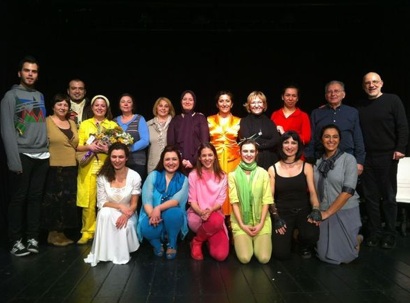 What kind of promotional tactics did you use to promote awareness of your fundraising efforts for the film?
What kind of promotional tactics did you use to promote awareness of your fundraising efforts for the film?
We have been using social media (mostly Facebook and Twitter) and print media to call attention to our fundraising campaign. We have also been trying reach out to the international LGBT community and their supporters. Locally in Istanbul, several benefit events, such as a play and two parties have been organized for us. Several clubs have lent us their support by showing our trailer at their venues. We have also had postcards printed and distributed them.
Your campaign earned a lot of attention in the local press, is there an extended plan for the distribution of the film to continue to drive acknowledgement of this issue?
Yes, the national press has been responsive to our efforts to having news and op-ed articles published about our project. We hope that this interest will continue to grow, especially after we finish the film and start showing it. We hope to be able to get recognition at various film festivals both here in Turkey and internationally. This kind of recognition will help us to get more media coverage. That will help with our distribution effort to get this film seen by as many people as possible both in Turkey and elsewhere. We feel that this film will not only be of interest to people in Turkey, but also in our region with similar cultures, especially South Eastern Europe, the Middle East, and Central Asia.
My Child is currently raising money on Indiegogo
Get the latest scoop
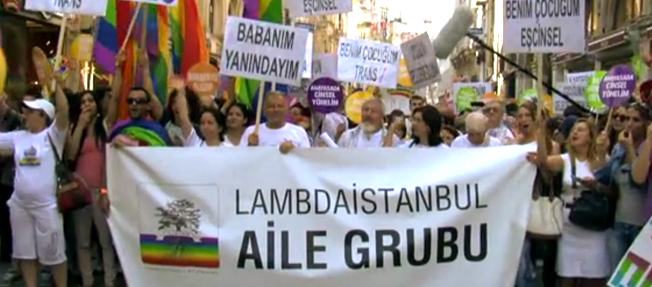
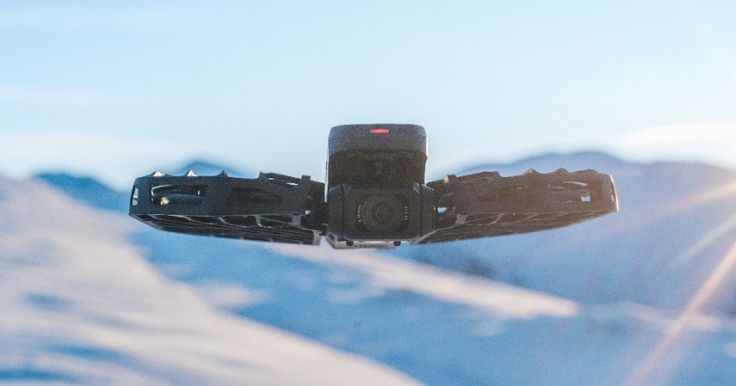
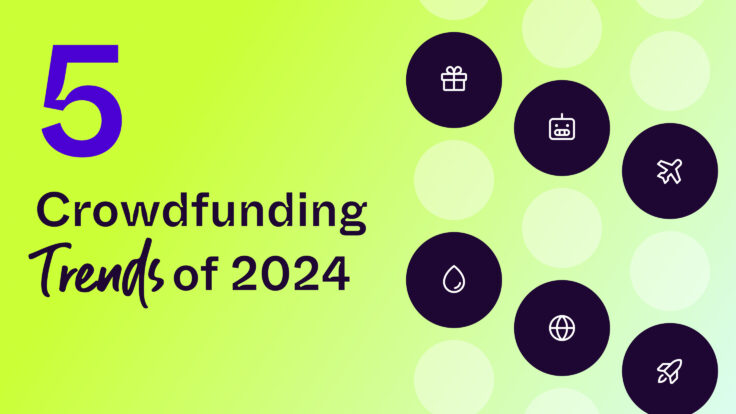
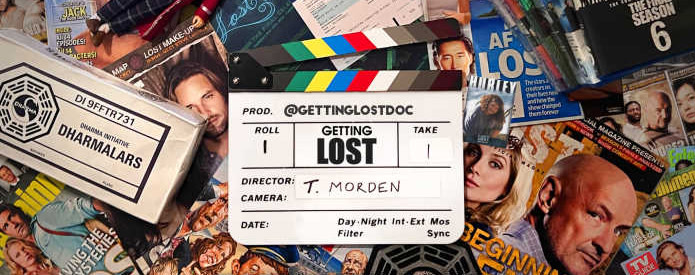
You must be logged in to post a comment.